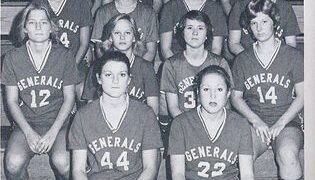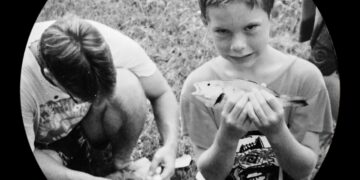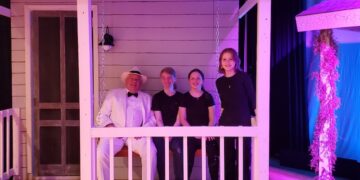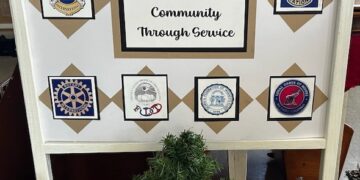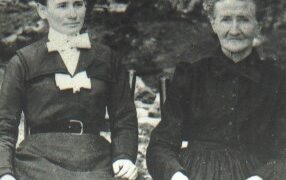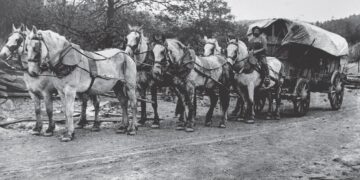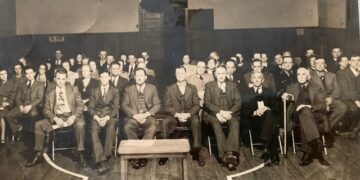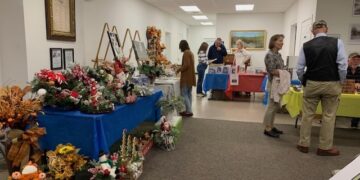
I’ll admit, there are days when I will stand in front of my southern gospel vinyl collection and think to myself, “What have I gotten myself into?” And really, that is something to think about…what’s the point of amassing all thissouthern gospel memorabilia? Well, I have seen hints of that answer in some of the people I’ve met along this ‘journey’…
When I began this venture in the summer of 2019, I immediately put out a request on-air for any vinyl, cassettes, etc. There was one promise – they would be cared for. They would not be sentenced to a back closet. They would be catalogued, digitized, and played on-air. In late 2019, one of our faithful listeners from the Timberville area graciously donated her father’s LP collection – over 300 albums all in near-mint condition. There were tears in her eyes as we unloaded these albums from the trunk of her car…she knew these were going to a good home and the music would be shared with hundreds over the airwaves for years to come.
But perhaps the event that made me step back and look at what exactly I was getting myself into came in the final days of December of 2020. The morning of December 28, we received news that Paul Heil, creator and longtime host of The Gospel Greats radio program, had passed away suddenly the day prior.
A quick background, The Gospel Greats was – and is – a two-hour weekly program dedicated to southern gospel music with featured artists each week. Paul Heil created the show, which was first sent out to a handful of stations in the Lancaster, PA, area, February 8, 1980. WBTX would become one of the first stations to carry the program on June 7 of that same year. Paul Heil’s name and voice had become synonymous with southern gospel music for over 40 years.
In February of 2021, Paul’s widow, Sheila Heil, had made known on Facebook that, with the passing of Paul and The Gospel Greats eventually going under new ownership, efforts were underway to clean out, and eventually sell, the office location in Lancaster. In March, I received an invitation to visit Sheila and see some of the items that were available.
I had no idea what to expect that first visit in March. Paul’s passion for southern gospel music became evident; his willingness to archive and preserve as much of, not just his own program, but the music itself, as possible. Although his main collection of LPs had gone to a private collector, I left that day in March with over 100 additional LPs, some tape equipment, and copies of Singing News Newspapers (the magazine format did not come until 1983).
A second and final visit in June yielded not just some more albums, but a collection of reel-to-reel audio tape of previous The Gospel Greats programs. In a similar manner to the aforementioned listener, I could tell that Sheila was glad and perhaps even comforted to know that items from Paul’s collection were going to a good home, where they would be taken care of and preserved for years to come. (Other items from his collection, such as over 40 years of interviews, were properly donated to the Southern Gospel Music Association).
As I began to give these items a new home at WBTX, I began to realize not just the rarity of many of the items, but the opportunities that abounded.
Southern gospel music has a niche market. There is an even smaller market for southern gospel history, and very few (especially my age) are taking an interest in the genre, more or less the history. Here I was, presented with the resources to do something about this problem I was seeing.
Let’s start with the core of the ‘research library’ – the LPs. Over 1,000. I would safely say at least 90% are unreleased…you cannot find them on CD or via streaming. That’s the key issue with making southern gospel history accessible, the music is not accessible. The solution? Use these LPs – digitize them, showcase them on-air, treat them like CDs.
But the LPs are just half the story – southern gospel music has a story that goes beyond the music. Another problem…the information is inaccessible. Here again, the solution? How about the genre’s leading publication, Singing News Magazine? Paul Heil’s collection gave me a nearly complete archive from 1978-1983 and then 1996 to present. Once indexed for easy access, I am then able to pull the information I need, information that often one cannot find on the Internet.
Every day, it seems as though new opportunities come about. The collection is constantly growing, and I am often times approached by listeners ready to donate their items. To me, this is not just about building a collection, but more a library. I feel as though I am being ‘equipped’ to do something. I do not know for certain the end result, but I feel the best I can do is share this collection with the listeners, and keep the memories of groups such as the Cathedrals, Hinsons, Florida Boys, Speers, and Rambos alive and well for generations to come.

